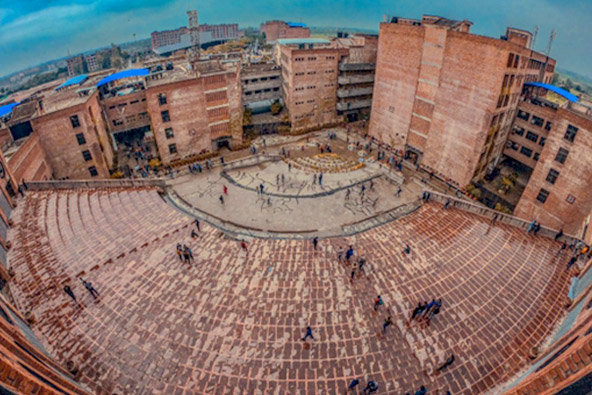Lovely Professional University maintains and is regulated as per national building code (NBC), Bureau of Indian standards (BIS), Ministry of Consumer affairs Govt. Of India. These guidelines lay forward the concept of sustainable architecture to maximize output with minimum and judicious use of resources. In this regard university buildings are equipped with rain water harvesting pipelines, central collection pool for rain water, a dedicated pipe-line that it's a 9-inch diameter pipeline, extending over a kilometer in length. These integrated efforts to ensure adequate infrastructure with minimum wastage of clean water has made LPU buildings sustainable, green, and beautiful.
Building standards followed by University:
Design Philosophy Water Efficiency The design of university buildings is in alignment with the infrastructure standards to preserve water and reduce extraction of fresh water. With every building maintaining its own water pipeline for water harvesting, there is collection of water and the same is used to re-generate ground water table level. University plans to reduce its fresh water intake with more dependency of other water sources and make buildings water efficient by refurbishing them as per requirements. Moreover, the walls of university buildings supports plant climber hangings that conserve water and make buildings cool and green.
National Building Code of India 2016 (NBC 2016)
The National Building Code of India (NBC), a comprehensive building Code that offers principles for controlling building construction activities nationwide. All organisational buildings engaged in building new construction projects, educational organizations should adhere to administrative rules, development control rules, and general building requirements are the main components of the Code. Other requirements include fire safety, building and plumbing services, sustainability, and asset and facility management, as well as requirements for materials, structural design, and construction (including safety).
Water Conservation Monitoring
University has provisions to monitor the water used and reused by piezometers installed at various locations across the campus. As measurable outcome, University ground water table level has risen by 6 feet in past few years that is a significant achievement in conserving water. In addition to this, water extraction is approved by Government agencies to which University adheres in letter and spirit. University plans to further raise ground water level of nearby areas by 10 feet by 2025. In this regard, University has been consistently expanding its number of rain water harvesting bores which currently stands at 39.
Rainwater Harvesting
LPU has implemented a comprehensive approach to rainwater harvesting, effectively conserving water resources across the campus. A water pipeline network captures rainwater from surface runoff, including collection from terraces, and channels it to recharge wells. The university has established 39 rainwater harvesting bores, or reverse bores, which help replenish the groundwater table—evidenced by a rise of approximately 6 feet as monitored by a piezometer. Efficient watering of plants is enhanced by strategically placed water sprinklers. The rainwater harvesting system also captures runoff from residential building rooftops, directing it through pipelines into recharge wells. The university has implemented rainwater harvesting systems across the campus to recharge borewells and enhance groundwater levels, contributing to long-term water sustainability. This harvested water is then treated and reused, enhancing building sustainability.
Punjab pollution control board water pollution and prevention control
Lovely Professional University has established legal agreements with the Punjab Pollution Control Board for water pollution prevention and control. This partnership underscores LPU’s commitment to environmental sustainability and aligns with regional goals for water and resource security. By collaborating with the board, LPU actively mitigates potential waste-related risks to water sources, ensuring responsible management of pollutants and safeguarding local water quality for the community. This initiative reflects LPU's dedication to fostering a healthier environment and promoting sustainable practices.
Click here
Clean water and sanitation annual report
The attached Annual Report highlights LPU's commitment to conscious water usage through its adherence to national building standards, including the National Building Code (NBC) and Bureau of Indian Standards (BIS). These guidelines emphasize sustainable architecture, focusing on maximizing output with minimal resource use. The university's buildings are equipped with rainwater harvesting systems, a central collection pool, and a dedicated 9-inch pipeline extending over a kilometer, ensuring efficient water management. These integrated efforts reflect LPU's dedication to creating sustainable, green, and resource-efficient infrastructure, promoting water conservation across the campus.
Click here
Drinking Water Testing Report
LPU's commitment to sustainability is exemplified through its rigorous and continuous water testing program, a vital initiative in ensuring that the water supplied and used on campus meets the highest standards of safety and cleanliness. This program not only safeguards the health and well-being of students, faculty, and staff but also demonstrates the university's dedication to responsible water management. By conducting regular water tests, LPU reinforces the importance of water quality and conservation, setting a commendable example for sustainable practices. This initiative extends beyond the campus, contributing to a healthier and more environmentally conscious future for society at large.
Click here to view





